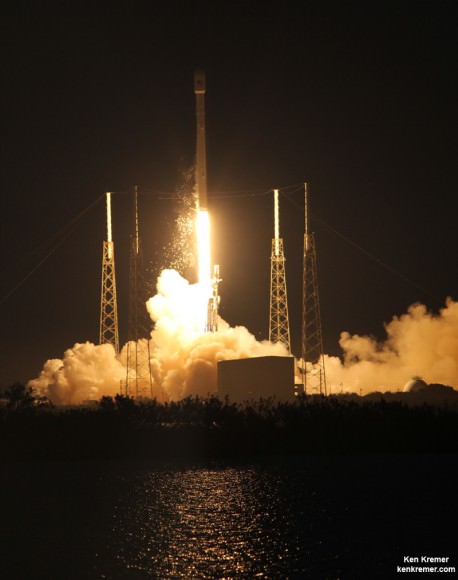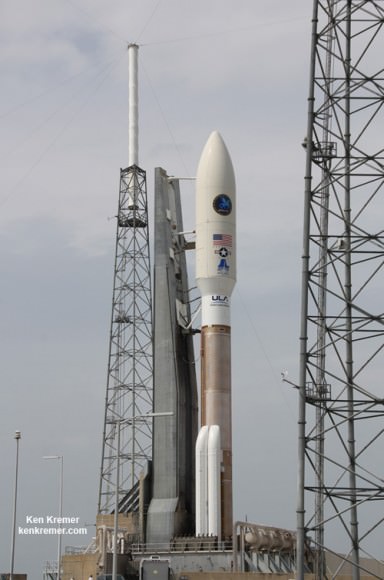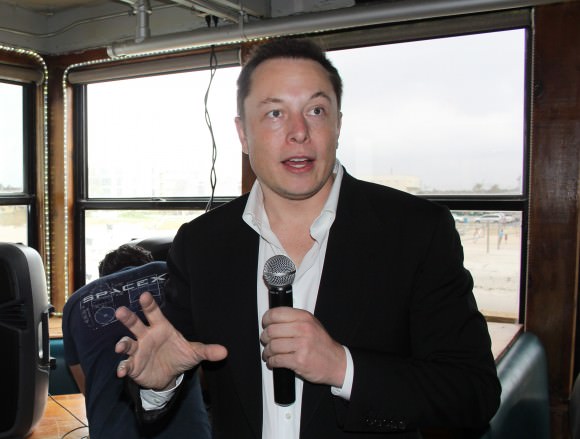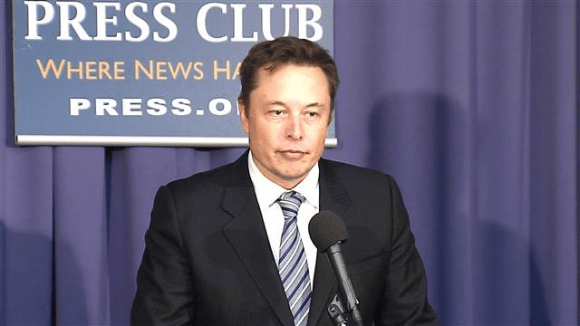SpaceX CEO Elon Musk announces lawsuit protesting Air Force launch contracts while speaking at the National Press Club in Washington, DC on April 25, 2014
Story updated[/caption]
Elon Musk, CEO and founder of the upstart commercial launch venture SpaceX, announced at a press conference today, Friday, April 25, that SpaceX is filing suit against the Federal Government to protest and break the US Air Force’s awarding of lucrative launch contracts for high priority national security satellites to a sole rocket provider – United Launch Alliance (ULA) – on a non competitive basis.
The gloves are officially off in the intensely mounting duel over multibillion dollar Air Force military launch contracts between SpaceX and ULA.
“The official protest document will be available Monday, April 28th at www.freedomtolaunch.com and will be filed with the United States Court of Federal Claims in Washington, D.C.,” said SpaceX in an official statement.
Musk said the Air Force launch contract with ULA amounted to a continuing monopoly, was unfair by blocking SpaceX from competing for launches of surveillance satellites and would cost taxpayers billions of extra dollars in coming years.
“What we feel is that this is not right – that the national security launches should be put up for competition and they should not be awarded on a sole source, uncompeted basis,” said Musk at the briefing called on short notice and held at the National Press Club in Washington, DC.

The latest Air Force launch contract dated to December 2013 guarantees the “block buy” purchase of 36 rocket cores from ULA for national security launches for the DOD, NRO and other government agencies, at a significantly reduced cost compared to earlier contracts.
A further 14 cores were to be awarded on a competitive basis, including bids from SpaceX and others who seek to gain Air Force certification. Several of those launch awards have now been deferred indefinitely.
ULA is a joint venture between aerospace giants Boeing and Lockheed Martin, formed in 2006, that has launched over 80 satellites to orbit and beyond including many NASA science and mission probes like Orion EFT-1, Curiosity, MAVEN, TDRS and more.
It manufactures the Delta IV and Atlas V unmanned, expendable rocket families that are currently the only boosters certified to launch the high value military payloads at issue in the lawsuit announced on Friday by Musk.
The newest versions of the Delta and Atlas rockets – known as EELV’s (Evolved Expendable Launch Vehicles) have had nearly flawless records of success since being introduced some dozen years ago by the companies individually, before the ULA merger.

Musk wants his company’s newer and he says much cheaper Falcon 9 and Falcon Heavy rockets to be certified by the Air Force and included in the competition for launch contracts.
To date the Falcon 9 has launched only 9 times. Only four of those were in the new and more powerful configuration needed by the Air Force.
Musk is not asking that the launches be awarded outright to SpaceX. But he does want the Air Force contract cancelled and re-competed.
“We’re just protesting and saying that the launches should be competed,” Musk said.
“If we compete and lose that’s fine. But why were they not even competed? That just doesn’t make sense.”
“So far we are most of the way through the certification process. And so far there have been zero changes to the rocket. Mostly it’s just been a paperwork exercise.”
“Since this is a large multiyear contract, why not wait a few months for the certification process to complete. And then do the competition. That seems very reasonable to me.”
Musk said it costs four times more to launch ULA’s Delta or Atlas rocket vs. a SpaceX Falcon rocket.
“The ULA rockets are basically four times more expensive than ours. So this contract is costing US taxpayers billions of dollars for no reason.”
“Each launch by ULA costs American taxpayers roughly $400 million per launch. They are insanely expensive. I don’t know why they are so expensive.”
The Falcon 9 lists for about $60 Million per launch, but rises to about $100 million after the certification costs are included, Musk explained.
“So yes the certification does make our Falcon 9 rocket more expensive. But not 400% more expensive.”
“Our rockets are 21st century design,” said Musk to obtain the most efficiency. He said ULA’s designs date back to the 90s and earlier with heritage hardware.

To date the Falcon 9 has already been used three times under a $1.6 Billion contract with NASA to launch the private SpaceX Dragon resupply vessel to the International Space Station (ISS) – most recently a week ago during the April 18 blastoff of the SpaceX CRS-3 mission from Cape Canaveral.
It is also being used to launch highly expensive communications satellites like SES-8 and Thaicom-6 for private companies to geostationary orbits.
“It just seems odd that if our vehicle is good enough for NASA and supporting a $100 billion space station, and it’s good enough for launching NASA science satellites, for launching complex commercial geostationary satellites, then there’s no reasonable basis for it not being capable of launching something quite simple like a GPS satellite,” said Musk.
“Our only option is to file a protest.”
Furthermore as I wrote here in a prior article, US National Security launches are now potentially at risk due to the ongoing crisis between Russian, Ukraine and Crimea because the RD-180 first stage engines powering the Atlas V are designed and manufactured in Russia by NPO Energomash, majority owned by the Russian Federation.

“The head of the Russian space sector, Dmitry Rogozin, was sanctioned by the White House in March 2014 in the wake of Russia’s aggression in Ukraine,” says SpaceX.
The RD-180 engine supply could be cut off in a worst case scenario if economic sanctions against Russia are increased by the Western allies.
ULA has a two year contingency supply of the RD-180’s and blueprints to begin production, if needed.
However in the event of a cutoff, it would take at least three to five years to start and certify RD-180 engine production somewhere in the US, a ULA spokesperson told me recently at Cape Canaveral.
This possibly leaves a 1 to 3 year gap with no Atlas V 1st stage engine supply.
The Delta IV rockets and engines by contrast are manufactured in the US.
“In light of international events, this seems like the wrong time to send hundreds of millions of dollars to the Kremlin,” said Musk.
“Yet, this is what the Air Force’s arrangement with ULA does, despite the fact that there are domestic alternatives available that do not rely on components from countries that pose a national security risk.”
Stay tuned here for Ken’s continuing SpaceX, Orbital Sciences, commercial space, Orion, Chang’e-3, LADEE, Mars rover, MAVEN, MOM and more planetary and human spaceflight news.


SpaceX deserve a level playing field.
Besides, Boeing and ULA haven’t hesitated to sue the USAF in the past.
I am very sad to read this. 🙁 Its really sad to see such a great company as SpaceX becoming involved in military et al. business. After all, its a private company, so they need to do what is necessary to increase their profit. But I had hoped they were more morally stable.
I’m pleased at least someone else feels this way. I agree and it’s a big disappointment to me. Musk seems morally grounded especially with Tesla – both the way he’s running it and the motivation for the company’s existence. But now getting involved in military nonsense? Wow. The world must start *standing down* in this regard, not ramping up, and it’s the most powerful men and nations that have to lead the way.
You’d like them to pass up 70 billion dollars in contracts over the next 15 years (that’s the projected US Airforce launch budget over the next 15 years), just so they can protest the launch of GPS, communications, and US Navy weather sats? Sure there are a few classified spy sats in that bunch too, but they don’t make up every launch. Most of them are simply “civilian-like” satellites that are owned by the US military.
That’s a heck of a lot of money to snub your nose at for a pointless protest… one that doesn’t even protest the things you want to protest!
This article says “lucrative launch contracts for high priority national security satellites”. That doesn’t sound like what you describe. You have a source for your info as to what these launches actually are? Anyway to answer your question, yes of course. Should companies just do anything for money? Is that all that matters?
You are an idiot. The entire business model of SpaceX is to increase volume of launches and engine firings to reduce cost. Whether you like it or not a significant percentage of launches to orbit around the world are for US and other government assets. Elon explicitly calls out GPS as one of the payloads in question they would also include comms, weather and spy sats. So what no weapons here at all. I guess you never use GPS on your smartphone in protest of the Air Force. Give me a break.
One of the few specific powers of the Federal Government enumerated in the US Constitution is to provide for the common defense. “Spy” satellites provide factual data to the DOD regarding the activities of foreign powers.
It also strengthens the country to reduce wasteful launch costs born by taxpayers or borrowed from other countries or from future generations.
The Obama administration to their credit already has supported commercial launch; it’s within their proper powers to extend this to DOD beyond the well connected Lock-Mart ULA lobby.
Are you suggesting that military payloads are inherently immoral…?
Yes I do when it comes to space exploration. Space is no place for weapons. The major powers in this world have the opportunity to be respectful and peaceful with one another in space. We have the chance to NOT repeat history here, and we do not use it if we launch weapons. And I count spy satellites as weapons.
Well said. I would add that we have the same opportunity to do the same on Earth, right now. But it seems no one is willing to do what it takes to achieve that.
Hi Semmel,
“Spy” satellites, as you call them, are used to verify compliance with Arms limitation treaties. They have a legitimate role in preserving peace.
“Spy” satellites have also been used to identify mass graves in conflict zones, so they have a legitimate role detecting evidence of War crimes, and the protection of human rights.
I do share your abhorrence of super-weapons, but with respect, I don’t automatically count satellites among them.
Kind regards.
Elon never saw a tax payer’s dollar he didn’t like!
But he sure knows how to make friends in Congress and in the military:-)
Marcel
Interesting that he’s proposing saving billions of taxpayer dollars by offering a launch price a fraction of the $400 million ULA rate, but don’t let numbers and facts spoil your rant.
Second that. Everyone deserves cheaper (and equally reliable) launch, but especially when those launches are on the public’s dime. In that sense, it’s no different from NASA.
Get more results for the money. Let that ‘full penny’ thing start there, instead…
The only rant I see here is that Semmel seems to be trying to twist this so that Musk is the bad guy, when all he (Musk) is doing is trying to level the playing field.
Eisenhower’s warning about an unfettered military industrial complex is more appropriate today than it was when he first called the oncoming problem to our attention. Competition ala Musk is an ideal answer, at least until Musk changes his stripes, which does not seem at all imminent.
Putin’s recent reckless behavior while we purchase critical military rockets from him is even more scary and certainly gives Musk’s stand firmer ground.
I do not rant against Musk. I dont twist anything, I just express what I think, you can agree or disagree with me as you like. I am not political in my statement.
I agree that monopolies are a bad thing. But there is an other argument as well if you want to talk economy. Every spend tax-moneys dollar is seen as an investment. Being an investment, a return is expected. If you invest in weapons and if you expect a return, the only thing you can do is to use them. Therefore, investing in weapons, even if its only the transport of weapons, is immoral. I do not say that Musk is a bad guy, but it makes me sad that he opens this bag of worms.
It’s sad that in order to get to Mars, Elan might have to sell his soul to the merchants of death… Will our ‘champion’ be retired thusly? Does anyone else see the irony in this? Or is that clarity?
Dig…. every rocket that ever got into orbit has a ‘history’ as a war toy, somehow. Once or twice removed perhaps, but the ‘stain’ is there. I like the parable, where swords are turned into plowshares… so in a way… the sword has been removed from the stone and pointed at Mars!
Conversely, some of us are glad that the US government as chartered by the US Constitution is looking out to protect the nation by observing the world from space. It’s not like the history of the world shows people acting without aggression to their neighbors.
“You may not be interested in war, but war is interested in you.”
Leon Trotsky
The irony is that Telsa wouldn’t even exist without government subsidies and tax breaks. He’s suing the hand that feeds him.
Some interesting moral debates but nobody seems to have brought up the equally moral issue of transparency in Government military procurement. These contracts are way beyond telephone numbers and paid for by hard-working US citizens, at the very least there should be seen to be competitive tendering.